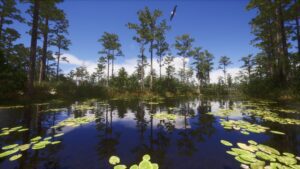
Dr. Maria Harrington, associate professor at the University of Central Florida and director of The Harrington Lab, is helping bring the beauty of nature to the digital world one virtual plant at a time. According to the Harrington Lab, The Virtual Arboretum is a digital, interactive version of the UCF Arboretum created for education and exploration. It’s built like a large open-world video game using real geographic data and expert input to make it look and feel as realistic as possible. Covering about 247 acres, the model was built using the Unreal game engine. What makes it special is that it connects to a website with a digital plant guide, so users can learn more about what they see when their curiosity strikes.
Since 2016, Dr. Harrington and her team have launched 16 new virtual plant collections on the Epic Games Unreal Engine Marketplace, a global online platform used by game designers, developers, and artists. These digital plant packages, each containing between 25 to 35 detailed 3D plant species, are now available through Fab.com, Epic Games’ e-commerce store. Since the lab began this project, over 473,000 plant packages, equaling about 16 million individual plants, have been downloaded worldwide, with a portion of the sales supporting creative contributors, UCF, and the lab itself.
But these aren’t just any video game plants. Created through years of interdisciplinary research, each one is botanically accurate and part of an immersive educational experience. “We’re blending science, art, and technology to create realistic models of nature,” said Dr. Harrington. “These digital tools help people learn about ecosystems, plants, and the environment in a way that feels interactive and alive.”
What started in 2016 as a small research project between Dr. Harrington and her students has grown into an internationally recognized effort. The project received a MegaGrant from Epic Games in 2020, allowing the lab to launch version 1.0. Thanks to support from the UCF Foundation Gap Fund, version 2.0 was released in 2024, showcasing even more lifelike plants and expanding global reach.
With more than $5,700 in software royalties earned so far, the project is not only opening up new learning opportunities but also pioneering how universities like UCF can share and monetize creative digital media innovations with the world.
Dr. Harrington’s work proves that the future of education, art, and technology can thrive digitally and expand understanding of the natural world through creativity.
Check out the Harrington Lab at UCF at the Epic Games Fab.com store to see all of the plant models.
Written by Majdulina Hamed.
Published to Nicholson News on July 1, 2025.
If you have any news, accomplishments or highlights about your work or life, please be sure to share them with us, by emailing us at NicholsonNews@ucf.edu.